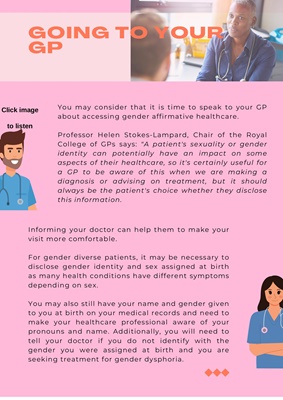
GOING TO YOUR
GP
Informing your doctor can help them to make your
visit more comfortable.
For gender diverse patients, it may be necessary to
disclose gender identity and sex assigned at birth
as many health conditions have different symptoms
depending on sex.
You may also still have your name and gender given
to you at birth on your medical records and need to
make your healthcare professional aware of your
pronouns and name. Additionally, you will need to
tell your doctor if you do not identify with the
gender you were assigned at birth and you are
seeking treatment for gender dysphoria.
You may consider that it is time to speak to your GP
about accessing gender affirmative healthcare.
Professor Helen Stokes-Lampard, Chair of the Royal
College of GPs says: "A patient's sexuality or gender
identity can potentially have an impact on some
aspects of their healthcare, so it's certainly useful for
a GP to be aware of this when we are making a
diagnosis or advising on treatment, but it should
always be the patient's choice whether they disclose
this information.